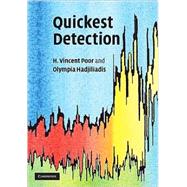
Note: Supplemental materials are not guaranteed with Rental or Used book purchases.
Purchase Benefits
What is included with this book?
| List of figures | p. x |
| Preface | p. xi |
| Frequently used notation | p. xiii |
| Introduction | p. 1 |
| Probabilistic framework | p. 6 |
| Introduction | p. 6 |
| Basic setting | p. 6 |
| Probability spaces | p. 6 |
| Random variables | p. 7 |
| Expectation | p. 8 |
| Radon-Nikodym derivatives | p. 10 |
| Conditional expectation and independence | p. 11 |
| Random sequences | p. 15 |
| Martingales and stopping times | p. 18 |
| Martingales | p. 19 |
| Stopping times | p. 24 |
| Continuous-time analogs | p. 26 |
| Brownian motion and Poisson processes | p. 27 |
| Brownian motion | p. 28 |
| Poisson processes | p. 30 |
| Continuous-time semimartingales | p. 32 |
| Stochastic integration | p. 34 |
| Markov optimal stopping theory | p. 40 |
| Introduction | p. 40 |
| Markov optimal stopping problems | p. 40 |
| The finite-horizon case: dynamic programming | p. 41 |
| The general case | p. 41 |
| The Markov case | p. 46 |
| The infinite-horizon case | p. 50 |
| A martingale interpretation of the finite-horizon results | p. 51 |
| The infinite-horizon case for bounded reward | p. 52 |
| The general infinite-horizon case | p. 55 |
| The infinite-horizon case with Markov rewards | p. 59 |
| Markov optimal stopping in continuous time | p. 60 |
| Appendix: a proof of Lemma 3.8 | p. 61 |
| Sequential detection | p. 65 |
| Introduction | p. 65 |
| Optimal detection | p. 65 |
| Performance analysis | p. 74 |
| The continuous-time case | p. 81 |
| The Brownian case | p. 81 |
| The Brownian case - an alternative proof | p. 86 |
| An interesting extension of Wald-Wolfowitz | p. 90 |
| The case of Itô processes | p. 91 |
| The Poisson case | p. 93 |
| The compound Poisson case | p. 100 |
| Discussion | p. 101 |
| Bayesian quickest detection | p. 102 |
| Introduction | p. 102 |
| Shiryaev's problem | p. 103 |
| The continuous-time case | p. 109 |
| Brownian observations | p. 109 |
| Poisson observations | p. 115 |
| A probability maximizing approach | p. 122 |
| Other penalty functions | p. 124 |
| A game theoretic formulation | p. 125 |
| Discussion | p. 128 |
| Non-Bayesian quickest detection | p. 130 |
| Introduction | p. 130 |
| Lorden's problem | p. 130 |
| Performance of Page's test | p. 142 |
| The continuous-time case | p. 144 |
| Brownian observations | p. 144 |
| It&ocaron; processes | p. 150 |
| Brownian motion with an unknown drift parameter | p. 152 |
| Poisson observations | p. 154 |
| Asymptotic results | p. 157 |
| Lorden's approach | p. 158 |
| Brownian motion with two-sided alternatives | p. 167 |
| Comments on the false-alarm constraint | p. 171 |
| Discussion | p. 172 |
| Additional topics | p. 174 |
| Introduction | p. 174 |
| Decentralized sequential and quickest detection | p. 175 |
| Decentralized sequential detection with a fusion center | p. 176 |
| Decentralized quickest detection with a fusion center | p. 184 |
| Decentralized sequential detection without fusion | p. 189 |
| Quickest detection with modeling uncertainty | p. 194 |
| Robust quickest detection | p. 194 |
| Adaptive quickest detection | p. 200 |
| Quickest detection with dependent observations | p. 201 |
| Quickest detection with independent likelihood ratio sequences | p. 201 |
| Locally asymptotically normal distributions | p. 203 |
| Sequential detection (local hypothesis approach) | p. 205 |
| Quickest detection (local hypothesis approach) | p. 210 |
| Bibliography | p. 213 |
| Index | p. 225 |
| Table of Contents provided by Ingram. All Rights Reserved. |
The New copy of this book will include any supplemental materials advertised. Please check the title of the book to determine if it should include any access cards, study guides, lab manuals, CDs, etc.
The Used, Rental and eBook copies of this book are not guaranteed to include any supplemental materials. Typically, only the book itself is included. This is true even if the title states it includes any access cards, study guides, lab manuals, CDs, etc.